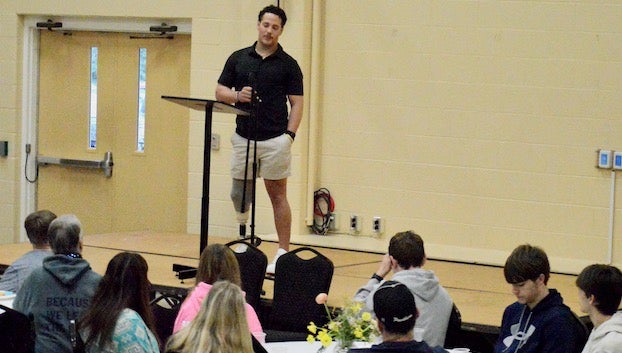A work in progress
Published 9:54 pm Monday, March 28, 2011

In this file photo, East Carolina coach Ruffin McNeill (center) talks to his team after a practice last season. On Saturday, the Pirates will hold their first spring scrimmage. (WDN Photo/Brian Haines)
GREENVILLE — The change has begun, and judging from last year’s results, there quite literally is no where else to go but up for the East Carolina defense.
Playing in a 4-3 base defense that was packed with inexperienced, undersized players, East Carolina finished last or near the bottom of every major defensive statistical category a year ago.
Despite the defensive woes, the Pirates finished with a 6-7 record and received an invite to the Military Bowl where it lost 51-20 to Maryland.
After taking some inventory, second-year head coach Ruffin McNeill and second-year defensive coordinator Brian Mitchell scrapped their 4-3 alignment and in favor of a 3-4 base defense that should better hide the weaknesses of a year ago, while adding much-needed speed and athleticism in the process.
Mitchell said the decision to go to the 3-4 was something that he had thought about as early as last year.
“Probably towards the end of last season I had thoughts (about changing the defense) in my mind and was thinking how could we get our best athletes on the field,” Mitchell said. “If you saw the Maryland game we brought in some 3-3-5 (packages) that were successful on third downs against Maryland and that kind of solidified things for me a little bit.”
Heading into 2010, the Pirates lost 9 of the 11 defensive starters that were a fixture on back-to-back Conference USA title-winning teams. This year, the only two returning starters were cornerbacks Emanuel Davis and Travis Simmons.
What allowed East Carolina to win those two C-USA crowns was a defensive line that was powered by two future NFL draft picks in Linval Joseph (second round, N.Y. Giants) and C.J. Wilson (seventh round, Green Bay Packers), along with the play of stellar veterans Jay Ross and Scotty Robinson; all of which were near or over 300 pounds.
Last year, the Pirates four down linemen consisted of one senior, Josh Smith, and ton of undersized, youthful players.
“You’re talking about defensive ends last year in a 4-3 that were 215-220 pounds, that’s not what you need in a 4-3; that’s 3-4 guys,” Mitchell said. “I had to go back and look at myself in the mirror and ask ‘who are we?’ And we are not a 4-3 defense and that’s because we don’t have 4-3 talent here, we have 3-4 talent.”
The move is an exciting one and coincides with a rising trend. The 3-4 is becoming more and more in demand throughout all levels of football (this year’s Super Bowl featured two 3-4 teams) because defensive coordinators can attack offensives in a more creative fashion.
“It’s a couple of things,” Mitchell said. “One: You’re gapped up in the middle. You’re more sound up the middle and more sound on the perimeter. The ball should never get outside and they should never crease you down the middle.
“Second of all, I think the unpredictability of where the blitz is coming from (is an advantage). Whether it’s a three-man, four-man, five-man or six-man (blitz), the unpredictability is going to give teams that opportunity to miss out on some (assignments). We ran the 3-3-5, which is very similar to the 3-4, at BYU and we counted about 8 to 10 snaps (per game) where the O-line missed an assignment just because of that unpredictability. I’m banking on that with our guys.
“Thirdly, we get a more athletic guy on the football field. Whether it’s a Justin Dixon or Marke Powell or a Maurice Falls, whatever, you can get your best athletes on the football field.”
The plan last year was to run a blitz-heavy, 4-3 defense, however, the Pirates finished the season with a mere 14 sacks to place 109th out of the 120 FBS teams.
While it should be noted that freshman defensive end Justin Dixon, who accrued three sacks in the first four games, did not play the rest of the season due to injury. It should also be noted that despite missing nine games Dixon still ended the season tied for the team lead in sacks with freshman DE Matt Milner.
“I think we were predictable,” Mitchell said. “And when we did blitz, there were situations where we did not win the one-on-one battles. Now we can put a better athlete on the field and take a lesser athlete off the field and we should win some of those one-on-one battles.
“There’s going to be times where there is a five-man pressure and you are going to have five one-on-ones. Someone has to win that battle. Someone has to come through for us. I’m hoping all five do, but I’m a realist. But I’m not going to concede all five getting blocked in one-on-one situations.”
Aside from the athletic boost, Mitchell felt the 3-4 is harder for opposing coordinators to prepare for.
“It’s a different feel. You have someone over the center, you have nose (tackle) … Most teams are seeing 4-3 week in and week out, they haven’t seen a lot of 3-4,” Mitchell said. “When you slant and angle guys and start moving guys, along with playing our base front, now it becomes very effective. Now if you add in a blitz, a fourth guy, now that unpredictability comes into play.”
The transition will take some time for the players to adjust. Mitchell said the move is hardest on the linemen.
“(The toughest adjustment) is learning how to play a four technique (playing over a tackle),” Mitchell said. “Where as before they were shaded one way or the other, you took an outside or an inside alignment and that was your gap. Now we are asking them to two-gap things. Instead of taking that six-inch power step, you’re taking a six-inch lateral step … I think that will be the hardest thing for our guys to adjust to.”
Mitchell will get a chance to see just how well his team has adjusted so far when the Pirates hold their first spring scrimmage Saturday at 10 a.m.
╩





